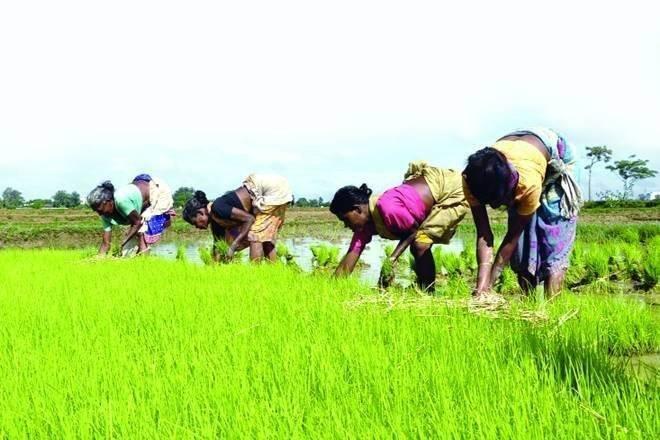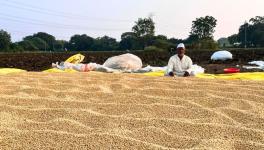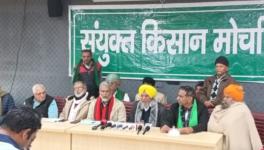Much More Needs to be Done Than Repeal of Laws to pep up Agricultural Sector

Image Courtesy: The Financial Express
On the occasion of Guru Nanak's birth anniversary on November 19, 2021, Prime Minister Narendra Modi announced the withdrawal of three agricultural laws enacted in 2020. Continuing the implementation of the Prime Minister's declaration on November 24, the Union Cabinet also approved the withdrawal of three agricultural laws. As per the Union Cabinet's decision, the withdrawal process of three agricultural laws will begin in the Parliament session starting on November 29.
The Union government had hoped that after the announcement of the Prime Minister, the Samyukta Kisan Morcha (SKM) would give up its struggle, and the struggling farmers at various places would return to their homes. The SKM has declared the Prime Minister's announcement and the approval of the Union Cabinet as its first success and has vowed to continue its struggle until the minimum support prices (MSPs) for agricultural commodities are legally guaranteed, and other important demands are legally guaranteed are considered.
Since the Union government issued the three Agriculture Ordinances in June 2020, which affected farmers, agricultural labourers, rural artisans, and other sections dependent on the agricultural sector, consumers, food security of the country, federal structure of the country, different people started giving their views on the implications of these ordinances. Before the enactment of three Agricultural Laws, various farmers' organisations had asked the Union government to withdraw these ordinances to avoid their deadly effects. Still, the Union government did not change its decision and enacted three Agricultural Laws in Parliament.
The various farmers' organisations of the country started their peaceful and democratic struggle on the borders of Delhi on November 26, 2020, to get these laws repealed and some of their other important demands complied with. During this struggle, several rounds of talks were held with the representatives of the Union government. During the talks, the Union government representatives acknowledged shortcomings in the laws, but instead of repealing them, they agreed to amend them.
The collective decisions of the SKM made their peaceful and democratic struggle a great success, which was lauded nationally and internationally. With time, a large number of farmers and other sections of the society living in different parts of the country became involved in this struggle. The Union government has decided to withdraw three Agricultural Laws after counting the implications of farmers' grievances in the forthcoming Assembly elections in different states.
The decision taken by the Union government to withdraw the three Agricultural Laws has been taken with undue delay. While the SKM considers it its first achievement, it will also benefit other sections besides the farmers in many respects. If only three Agricultural Laws are withdrawn, the plight of farmers, agricultural labourers, and rural artisans will be similar to that of June 5, 2020, when they were living in huge debt and abject poverty. All their hopes of life were dashed by the government and society to the point that many died by suicide, a sad reality that still goes on. Therefore, apart from withdrawing these three Agricultural Laws, there is an urgent need for the government, society and the sections dependent on the agricultural sector to take further steps.
Apart from the withdrawal of the three Agricultural Laws by the Union government, the demand for a legal guarantee on the Minimum Support Prices (MSPs) of the agricultural commodities of the SKM is very important.
The Agricultural Prices Commission was set up in 1965. It has been making recommendations regarding the determination of MSPs of various agricultural commodities, which the Union government generally accepts. Initially, the commission's recommendations were in favour of the farmers, but later they were against the interests of the farmers, which led to strong criticism from various farmers' organisations and some political parties.
To eliminate this criticism, the Union government has tried to give the impression that merely by renaming the commission as 'Commission on Agricultural Costs and Prices,' it would base its recommendations on agricultural production costs. But that is far from reality. There are a number of problems/shortcomings in calculating agricultural production costs.
Due to the different farming methods in different parts of the country, their production cost is also different. But when calculating the cost of production, the average of all areas/parts of the country is taken, which is unfair to the areas with high production costs. The labour of the farmer is also calculated for a short period. In contrast, the farmer is present 365 days, 24 hours a day, as per the requirements of agricultural production. Women of farmer families who work in the fields besides household chores, make tea and bread for agricultural labourers and rural artisans, take care of livestock and work in the fields. Their labour is not included at all in the cost of production. The land rent and wear and tear of agricultural buildings and machinery are greatly underestimated.
Therefore, Minimum Remunerative Support Prices (MRSPs) have to be fixed based on agricultural production costs calculated correctly instead of MSPs. In this regard, many farmers' organisations and some political parties have been demanding remunerative prices by calculating 50& profit on agricultural production costs as per Swaminathan's recommendation. If this recommendation is accepted, farmers who will have a marketable surplus, their current deficit loss-making agriculture will become profitable. The point to note in this regard is that according to official figures, 71% of the total farming families in the country are those who have less than 2.5 acres of land. These families have so little quantity of agricultural commodities to sell in the market that their income will be so low that they cannot support themselves in that income.
Keeping these aspects in view, the Union government has to divide the different parts of the country into different agricultural zones on the basis of agro-climatic conditions to ensure the production of agricultural commodities suitable there and procure them at remunerative prices. In this regard, the State governments have to fix the remunerative prices of vegetables, fruits and some other agricultural commodities and procure them or bridge the gap between these prices and the market prices.
Another critical issue for farmers is severe indebtedness. Different studies conducted in various states have brought the fact that almost all the landless, marginal, and small farmers, agricultural labourers, and rural artisans are born in debt and poverty, live their hard life in debt and poverty and die a death of deprivation, leaving behind huge debt and abject poverty or when all their hopes of life are dashed by the government and society, they attempt suicide.
They are not in a position to pay interest on their debt as they have borrowed for the stove burning, even for two meals. Indebtedness amongst these people creates numerous problems. The Union and State governments should write off their institutional and non-institutional debt/loans. In the long run, their income should be increased to such a level that they are in a position to repay their loans in time. They deserve salvation from the indebtedness problem.
The Union and State governments should contribute to Research and Development (R&D) activities to reduce the rapid rise in agricultural production costs. The Union and State governments should arrange interest-free loans for landless, marginal, and small farmers. The Union government should formulate policies regarding the import and export of agricultural commodities in the interest of farmers and the country. The Union and State governments should contribute to setting up agro-processing small industrial units in the rural areas.
The use of machinery and herbicides in the package of New Agricultural Technology' adopted to meet the country's food needs has drastically reduced agricultural employment, which has hit agricultural labourers and rural artisans the hardest. It has also affected landless, marginal, and small farmers. Under the Mahatma Gandhi National Rural Employment Guarantee Act (MGNREGA) and other similar employment schemes for these sections, employment should be ensured throughout the year as per their requirement. The wage rate should be equal to the minimum wage rate fixed by different governments.
Land reforms can make a meaningful contribution to these sections' interests, as proved by the results of land reforms carried out in different states. The income from the lands of Panchayats and religious institutions is aimed at the welfare of the poor. Sikhism teaches that "the mouth of the poor, Guru ki golak". Therefore, the lands of Panchayats and religious institutions have to be given to these poor sections for cooperative farming without charging any rent.
According to a United Nations report, family farming is vital to protecting the world's food supply and protecting the environment from pollution. An essential aspect of this report is to keep the agricultural sector out of the control of the capitalist / corporate world. Cooperative agriculture in Kerala and other states of the country is sending a significant message regarding the country's food security and protecting its environment from pollution.
There are more than 68,000 cooperatives of landless women in Kerala. The production of these women's cooperative farms is 1.9 times, and the net economic profit is five times more than other farms. Given these facts, the Union and State governments have to extend special assistance to the farmers, agricultural labourers and rural artisans engaged in cooperative agriculture.
For the betterment of the agricultural sector, the government has to adapt and adopt the pro-people and nature-friendly economic development model in place of the pro-capitalist/corporate model adopted in the country since 1991. Doing so will increase the share in national income of the 50% population working in agriculture from 16% to at least a level sufficient to meet the basic necessities of life — food, clothing, housing, education, health care, clean environment, and social security.
Like the rest of the world, India's richest class is obsessed with maximising its profits. A large section of the middle-income group in the country is living in the illusion that they are paying taxes, the income from which is being given to the farmers and other workers in the form of subsidies/grants. Even a student of elementary economics is well aware of the fact that indirect taxes outweigh direct taxes. Farmers and other workers are most affected by indirect taxes. The COVID-19 pandemic has made it clear that humans can survive without cars, bungalows, aeroplanes, expensive phones and other luxury items. Still, bread is essential to the survival of the human race, which is dependent on agriculture.
Understanding these facts, the middle-income group desperately needs to change its understanding of the agricultural sector. Agricultural labourers, rural artisans and other labourers have contributed to the success of the farmers' struggle. Although feudalism has been legally abolished in the country, feudal thinking is still prevalent among some farmers. Farmers' organisations have to take necessary steps in this regard. There is an urgent need for all sections of the agriculture sector to understand the spirit of cooperation and adopt it in all aspects of life. All these groups must make their members aware of the importance of education and health services and convey the message that suicides are not a solution to any problem, but the rest of the family suffers numerous issues after someone dies by suicide in the family.
Dr Gian Singh is a former professor at Department of Economics, Punjabi University, Patialia. The views are personal.
Get the latest reports & analysis with people's perspective on Protests, movements & deep analytical videos, discussions of the current affairs in your Telegram app. Subscribe to NewsClick's Telegram channel & get Real-Time updates on stories, as they get published on our website.
























